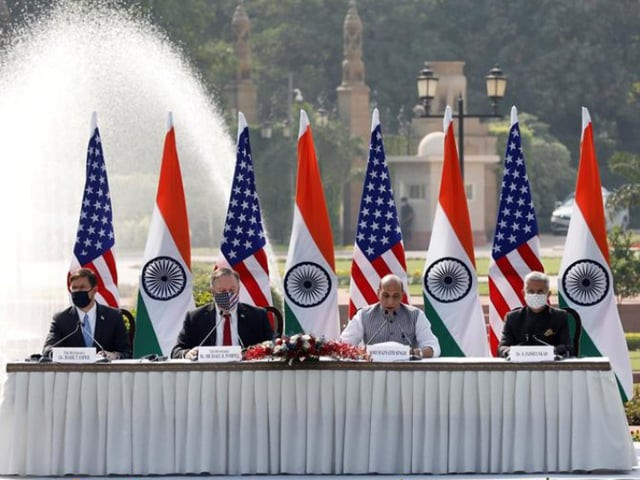US-India military pact threatens regional peace, warns Pakistan
Foreign office says India’s massive acquisition of armaments has serious repercussions for regional peace, stability

The United States and India signed a pact to share sensitive satellite and map data on Tuesday, prompting quick warning from Pakistan that the agreement will have serious repercussions for peace and stability in South Asia.
The annual US-India strategic dialogue comes at a time of heightened tension in the region, with Indian troops confronting Chinese forces on their disputed Himalayan border and deteriorating ties between arch rivals in the region.
Pompeo, who arrived in New Delhi on Monday along with Defence Secretary Mark Esper, said after talks with their Indian counterparts that the two countries had to work together to confront the threat China posed to security and freedom.
"Big things are happening as our democracies align to better protect the citizens of our two countries and indeed, of the free world," Pompeo told reporters after the talks with Indian Foreign Minister Subrahmanyam Jaishankar and Defence Minister Rajnath Singh.
"Our leaders, and our citizens, see with increasing clarity that the Chinese Communist Party is no friend to democracy, the rule of law, transparency, nor to freedom of navigation, the foundation of a free and open, prosperous Indo-Pacific," Pompeo said.
The new defence pact – the Basic Exchange and Cooperation Agreement on Geospatial Cooperation – was a "significant milestone" that would foster cooperation between the militaries of both countries, Esper told the news conference.
The United States planned to sell more fighter planes and drones to India, Esper added. The pact will give India access to a range of topographical, nautical and aeronautical data that is considered vital for targeting of missiles and armed drones.
It would also allow the United States to provide advanced navigational aids and avionics on US-supplied aircraft to India, an Indian defence source said.
The formal reaction from Pakistan came within hours after the US and India signed US-India Basic Exchange and Cooperation Agreement (BECA) which will allow India to gain access to precision data and topographical images – on a real time basis – from United States military satellites.
The signing of the long-negotiated defence pact comes in the backdrop of India's tense border standoff with China in eastern Ladakh.
The agreement was signed as part of 2+2 dialogue between the two countries. Observers believe that signing of the agreement just week before the US presidential election indicates that there is a bipartisan consensus in Washington on advancing strategic ties with India.
The ever-growing strategic and defence cooperation is part of the US designs to use India as a counterweight to China. The deepening US-Indian ties have implications for Pakistan, according to the observers.
And this was reflected in the Foreign Office statement issued immediately after the signing of BECA.
“Pakistan has been consistently highlighting the threats posed to strategic stability in South Asia as a result of provision of advanced military hardware, technologies and knowledge to India,” the Foreign Office statement read.
It added that India’s massive acquisition of armaments and expansion of its nuclear forces, including introduction of new destabilising weapon systems, were developments with serious repercussions for peace and stability in South Asia.
The statement noted that the recent unprecedented rate of missile tests conducted by India is yet another manifestation of dangerous Indian conventional and nuclear military build-ups.
“It again corroborates concerns expressed by several international experts on the military spin-offs of conducting high technology trade with India, which has not only eroded the international norms but has also resulted in negatively affecting the strategic stability in South Asia,” the Foreign Office said.
The developments, according to the official handout, clearly negate the argument that India’s mainstreaming in the international export control regimes will further the non-proliferation objectives of these regimes.
China dismissed Pompeo's accusations. "We urge Pompeo to abandon his Cold War mentality, zero-sum mindset, and stop harping on the 'China threat'," Chinese foreign ministry spokesman Wang Wenbin told a news briefing in Beijing earlier on Tuesday.
(With input from Reuters)



















COMMENTS
Comments are moderated and generally will be posted if they are on-topic and not abusive.
For more information, please see our Comments FAQ